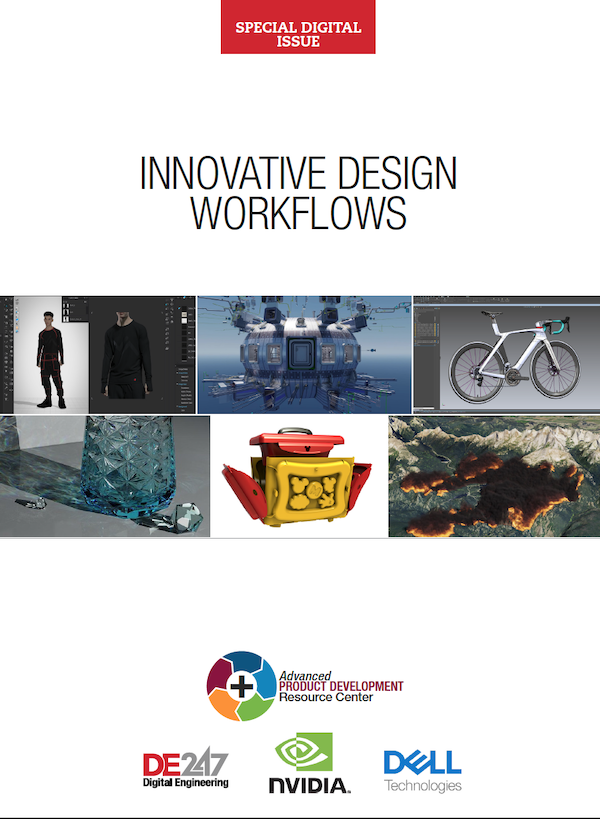
Briggs Automotive Company (BAC) Ltd. makes the BAC Mono, a lightweight, high-performance, road-legal supercar. Its wheels are designed with Autodesk Fusion 360’s generative design tools. (Image courtesy of BAC.)
Autodesk Manufacturing Summit: Betting on Generative Design and Additive Manufacturing
Autodesk showcases Fusion 360 during virtual event
Latest News
September 4, 2020
Last week, the Autodesk Advanced Manufacturing Summit joined the list of annual trade shows that have gone virtual, delivering its keynotes and customer stories as live-streamed and on-demand events.
In his opening, Srinath Jonnalagadda, VP of Go-to-Market Strategy, Autodesk, observed, “What we have seen in the last two months, is digital transformation that would have usually taken years compressed into a very short duration ... because of necessity.”
His remarks echoed observations made by speakers at the recent IoT World. With travel restrictions and mandatory social distancing creating a new normal, Autodesk sees a new window of opportunity for its cloud-friendly Fusion 360 offerings.
“This is fundamentally what teams expect. This is especially relevant now as teams are collocated and distributed across the planet,” Jonnalagadda pointed out.
Lightweighting with Fusion 360
The star customer of the show was BAC (Briggs Automotive Company), headquartered in Liverpool, UK. Neill Briggs, Cofounder and Director of Product Development, BAC, delivered the feature presentation.
“We have an obsession with weight saving. We focus on clever use of materials, processes, and software,” he revealed. “We take the lightest 17-inch alloy wheel and make it two kilograms lighter. But we weren’t content with that, so we used generative design. We worked closely with our friends at Autodesk, to basically apply the same load case to the same wheel, to see where we can optimize the structure.”
Fusion 360 has a constraint mechanism that lets BAC engineers preserve what they consider to be aesthetically desirable portions. By targeting other regions for weight reduction based on anticipated stresses and loads, “We saved an incredible 1.5 kilograms just from the centerpiece alone,” Briggs recalled.
The new Mono R from BAC pushes the envelop for the company's design process. It is the first time the company employs 3D-printed parts. “Now, as I sit here, we’ve got over 40 3D-printed parts on the car,” Briggs estimated.
The car is made of Graphene-enhanced composite body panels. “At the molecular level, the Graphene enhanced the structural properties of the carbon fiber … we’ve already attracted some luxury automakers with what we’re doing,” Briggs explained.
For racing fans, the good news is, the car goes from 0 to 60 MPH in 2.7 seconds, and 0 to 100 MPH under 6 seconds, according to Briggs.
“Ultimately it’s a five kilogram weight save on the entire car,” he revealed.
 Briggs Automotive Company (BAC) Ltd. makes the BAC Mono, a lightweight supercar. It's designed and manufactured using Autodesk Fusion 360 to generatively design a lighter-weight wheel. (Image courtesy of BAC.)
Briggs Automotive Company (BAC) Ltd. makes the BAC Mono, a lightweight supercar. It's designed and manufactured using Autodesk Fusion 360 to generatively design a lighter-weight wheel. (Image courtesy of BAC.) Using generative design in Fusion 360, carmaker BAC drastically reduced the weight of its wheel's centerpiece. (Image courtesy of BAC.)
Using generative design in Fusion 360, carmaker BAC drastically reduced the weight of its wheel's centerpiece. (Image courtesy of BAC.)Fragile Supply Chains
The pandemic has also forced many to reexamine their supply chain strategy, weighing the cost advantage of overseas production against the risk of shipping interruptions.
Ian Pendlebury, Associate VP of Engineering, joined Autodesk when his former employer Moldflow was acquired by Autodesk. “As we work through the global pandemic, we’ve seen inability to access supplies and goods. We’ve also seen businesses quickly retool and collaborate in ways that they may have previously thought impossible to do, to help with personal protective equipment,” he said.
For one customer, streamlining for the pandemic meant a tighter coupling of data and processes. Johannes Kilan, head of process technologies, ENGEL, discussed how he and his engineers archived what he called “a gap-less loop of data flow.”
“You can’t use the information from simulation in the tool setup, for example,” Kilan outlined the common issues. “And you can’t use the information from the machine to optimize your simulation. During simulation, you don’t know the behavior of the machine in the real world, so the quality of your simulation is lacking in some ways.”
ENGEL bridges simulation and production with ENGEL sim link. With this software, Autodesk Moldflow is linked to ENGEL production machines. “You can export simulation data to ENGEL machines, transfer process profiles and limits of an ENGEL machine to the software, and import real production data to Moldflow,” explained Kilan.
Balance Shifts from Global to Regional
Leanne Gluck, Manager of Business and Industry Strategy, Autodesk, noted the rapid change happening in response to COVID-19-related disruptions. Manufacturers are shifting “from reliance on long global supply chains to more local, distributed and on-demand manufacturing,” according to Gluck.
But Rush LaSelle, Senior Director of Digital Manufacturing, Jabil, pointed out, “While there’s a heavy push for regional production, the process will likely take the form of augmented dependency on Asia, not necessary wholesale migration. The reality is, it’s hard to move large, entrenched supply chains.”
This creates new pockets of opportunities for on-demand local manufacturing service providers and AM technology suppliers, who can help manufacturers bypass the need to invest in tooling.
“Going forward, the need to shift back from global to regional production will be more and more important. You'll start to see the 3D printer becoming the new form of UPS truck,” noted Brian Betty, Director of Business Development, Ultimaker.
More Autodesk Coverage
Subscribe to our FREE magazine, FREE email newsletters or both!
Latest News
About the Author
Kenneth Wong is Digital Engineering’s resident blogger and senior editor. Email him at kennethwong@digitaleng.news or share your thoughts on this article at digitaleng.news/facebook.
Follow DE





